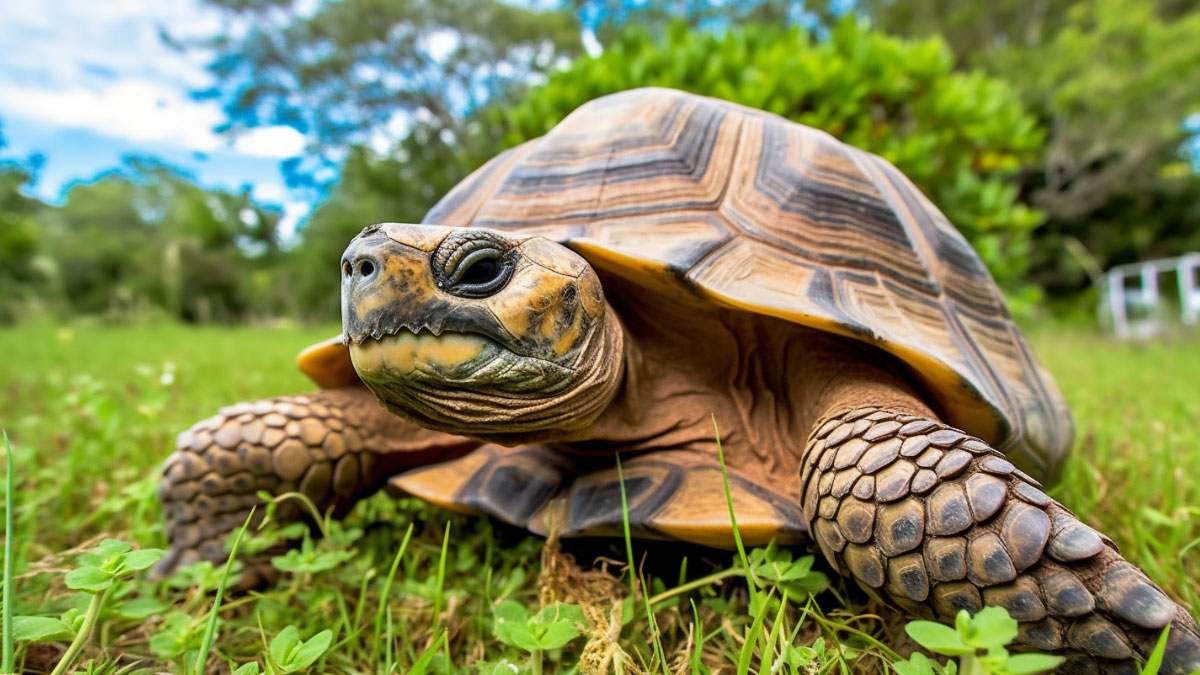How Long Does A Sulcata Tortoise Live?
Sulcata tortoises (Centrochelys sulcata) are amazing animals that have won the hearts of many people who enjoy reptiles. So, if you want to pet a Sulcata tortoise, you should know how long it will give you the company.
So how long a Sulcata tortoise lives? The Sulcata tortoise has a lifespan of about 50 to 150 years. In captivity, the Sulcata tortoise has an average lifespan of 54 years. Genetics, diet, environment, health care, and mental contentedness play a significant role in their lifespan.
Although the Sulcate tortoise can live up to 150 years, most petters can’t have their pet reach it. In this article, we will discuss the lifespan of the Sulcata tortoise and other relevant factors. Read on to learn everything you should know.
How Long Does A Sulcata Tortoise Live?
Contents
As we have already mentioned, the Sulcata tortoise has a lifespan of 50 to 150 years! However, if you look at most other animals’ lifespans, we can notice that no other animal has such a wide lifespan.
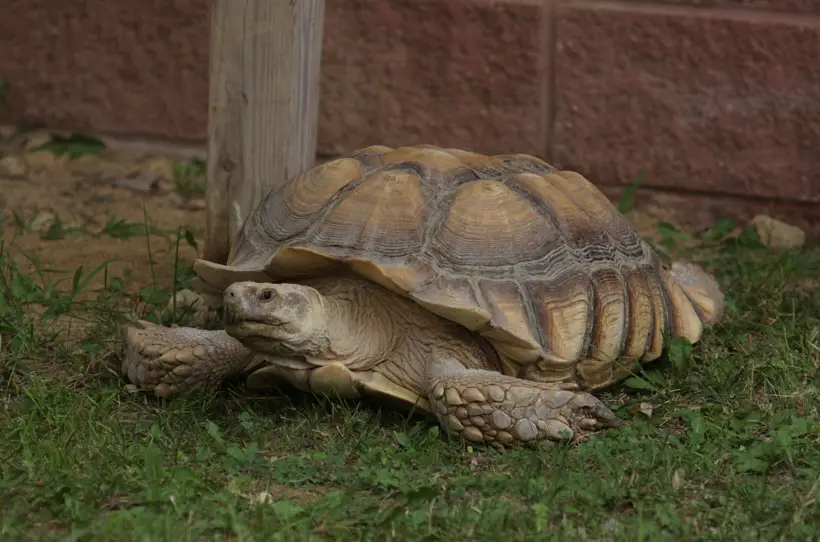
Sulcata Tortoise Lifespan Complicacy
In terms of statistics, the difference between the upper limit and the lower limit of a Sulcata tortoise’s life span is huge. A fully healthy Sulcata Tortoise can live up to 150 years.
Although, with no complex health problems and even with a completely healthy physique, a Sulcata tortoise can live short, around only 50 years.
This massive lifespan deviation is certainly concerning for any excited petter. Knowing that despite doing everything right, your pet may live up to its lifespan’s lower limit.
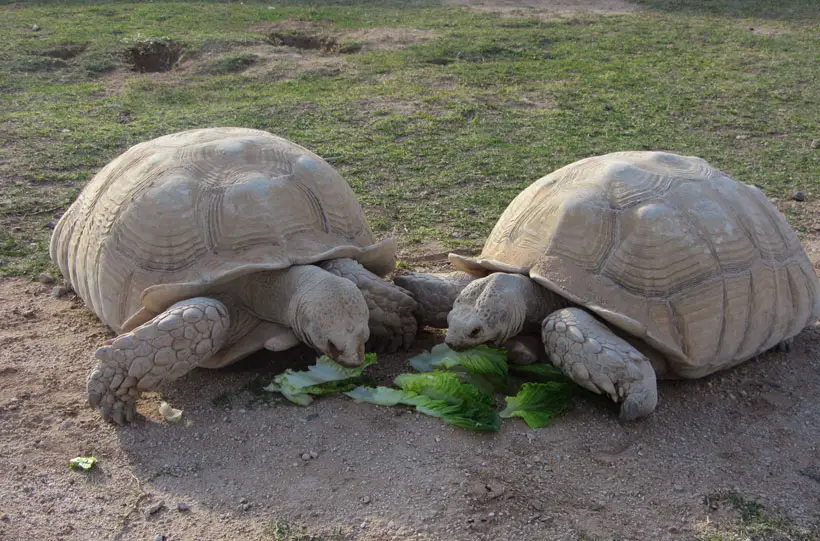
Why Do Sulcata Tortoises Have Such A Wide Lifespan?
Sulcata Tortoise has an average lifespan of only 70 years in the wilderness. Even though it is still almost 80 years less than its lifespan’s upper limit, there is a catch!
You may have noticed that animals in captivity live longer and has a better chance of reaching their longevity peak. That is not the case for Sulcata tortoises. Compared to the wilderness, they live less than 20 years on average in captivity.
Even though in captivity, they are much less prone to dying prematurely to any predators. Also, they do not necessarily need to work for their food, their meal is provided right at their doorstep.
Overall, Sulcata tortoises in the wilderness are much more greatly adaptable to the environment. Additionally, they are happier in the wild than in captivity, which positively reinforces their lifespan.
Factors Affecting The Sulcata Tortoise Lifespan
There are a lot of factors that can positively reinforce or negatively hamper the Sulcata tortoise’s lifespan. We have already discussed adaptability and mental contentment being factors, and now we will discuss the rest of the factors down below.
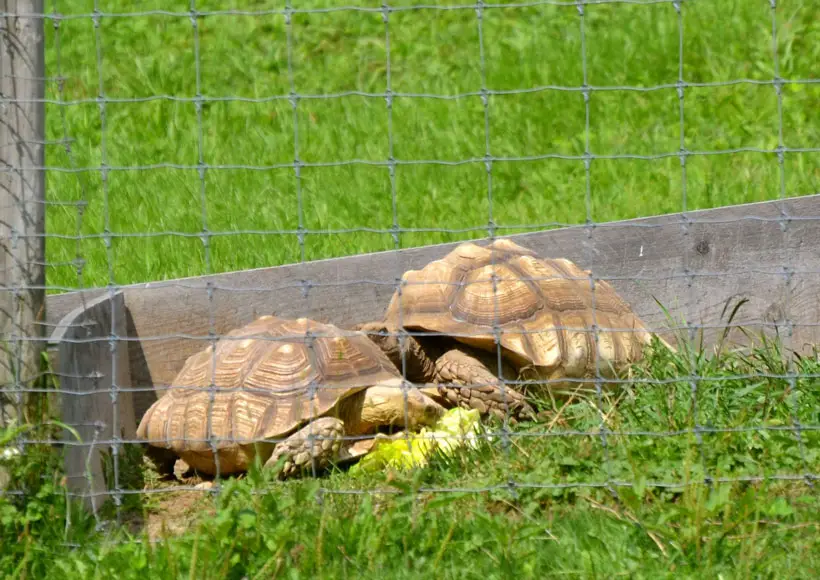
How Genetics Affect Your Sulcata Tortoise Lifespan?
The genetics of a Sulcata tortoise is surely fascinating. The Sulcata tortoise is a very large reptile and comes second to only Galapagos and Giant tortoises. The Sulcata tortoise is also the longest-living tortoise after Galapagos and Giant tortoises.
- Genetic Protection Against Aging: Large reptiles are generally known to live for longer. Studies have found that larger reptiles, especially tortoises, have multiple additional duplicate genes embedded in their DNA.
These duplicate genes serve as extra protection against aging. Hence, the larger tortoises, Galapagos and Giant tortoises, respectively, live longer than the Sulcata tortoises.
- Genetic Protection Against Cancer: Since these larger tortoises have duplicate genes, they hold the luxury to destroy these duplicate genes and cells if needed.
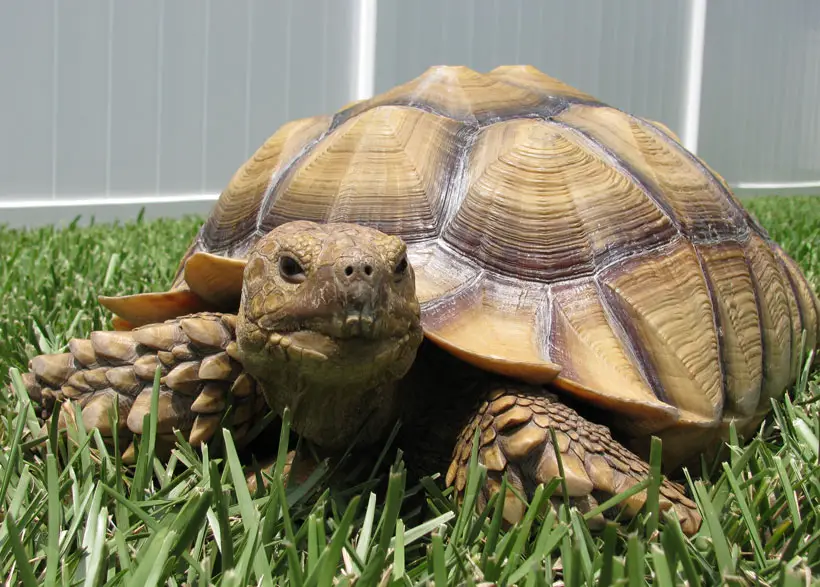
Cancer is such a deadly disease because it infects and spreads within the cells of a biological body faster than any medication can heal. However, the Sulcata tortoise is very much immune to such illnesses as they can just destroy the cancerous cells inside of their body at ease.
- Choosing The Right Parents: To sum up, it is necessary to breed the right tortoises. If you are looking for a long-term commitment, find the Sulcate tortoise that was bred between two large and healthy male and female tortoises, respectively.
Also, make sure that your pet’s parents had a well-above-average lifespan, as it may also affect your pet’s overall longevity.
Role Of Diet In Reinforcing Your Pet’s Lifespan
It should not come as a surprise that diet plays a major role in the longevity of your pet. A proper diet that covers all the necessary supplements in the right amounts goes a very long way toward ensuring your pet’s health.
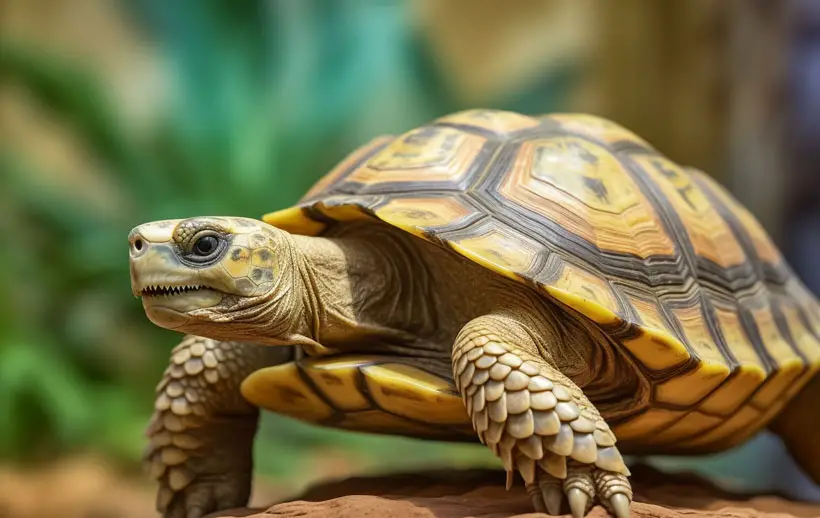
Hence, we are providing a nutrition chart to help you get a grip on your Sulcata tortoise’s diet.
| Nutrients | Required Amount Daily (%) | Food |
|---|---|---|
| Carbohydrate | ~ 40 | Carrots and parsnips |
| Protein | > 15 | Flowers, mushrooms, and mealworms |
| Calcium | > 12 | Collard greens and kale |
| Vitamin A | ~ 9 | Dandelion greens |
The right amounts of each of the nutrients are depended on your pet’s current age and weight. Thus, such a metric can only be reliably provided by a professional vet after checking on your Sulcata tortoise.
How Does The Perfect Environment Positively Reinforce Your Tortoise’s Lifespan?
The Sulcata tortoises are generally found at the very southern edge of the Sahara desert. They are perfectly adapted to the hot climate in the Sahara desert, which is, however, not to be confused with humidity.
- High Temperature Vs Humidity For Sulcata Tortoises: The Sahara desert boasts an average temperature of over 40℃ during the summer periods. However, the desert itself does not have much humidity, even though it has a very hot climate!
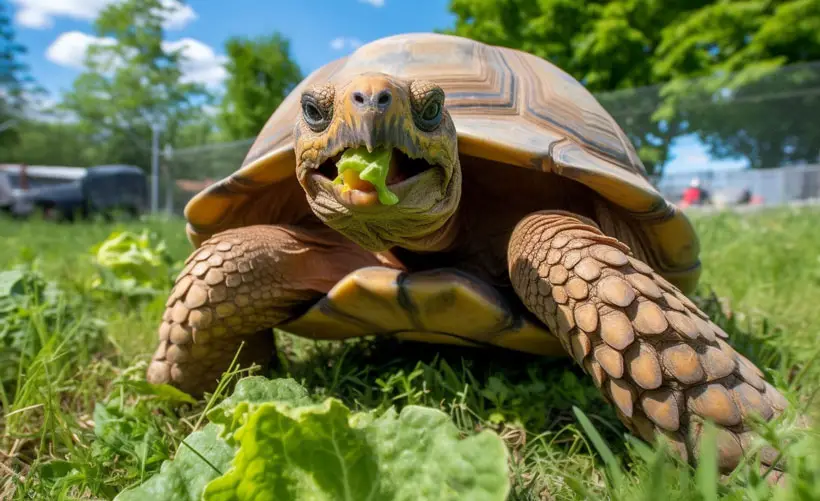
Simulating a hot environment is good for your Sulcata tortoise. However, most inexperienced owners do not pay heed to the room’s humidity. Exposure to high humidity can cause critical organ failure in Sulcata tortoises!
- Sulcata Tortoises Innate Habit: These tortoises are extremely adapted to live in such harsh environments as a desert. Through evolution, they have picked up this innate habit of digging. However, this is a crucial life skill when living in the desert.
Nevertheless, many inexperienced petters find it inconvenient and discourage their tortoises from digging. This is a crucial mistake, as burrowing stimulates dopamine in your tortoise’s neutron.
- The Perfect Environment: Animals are known to be great at adapting to new environments; can’t their tortoise adapt to a more civilized setting?
Well, technically, it can, but it can also affect its longevity. Over time, after generations of evolution, the Sulcata tortoises became as adapted as they are now to a desert environment.
Hence it would take many more generations for Sulcata tortoises to adjust to a more civilized setting without taking a toll on its longevity. The perfect environment for a Sulcata tortoise hence would be a hot but not humid ambiance with plenty of soil and mud.
Health Care For Your Sulcata Tortoise
Tortoises have very well-built immune systems and are very strong creatures. However, they are not indestructible. They are also vulnerable to several diseases such as stomatitis, bacterial or fungus infections, metabolic bone disease, and organ failure.
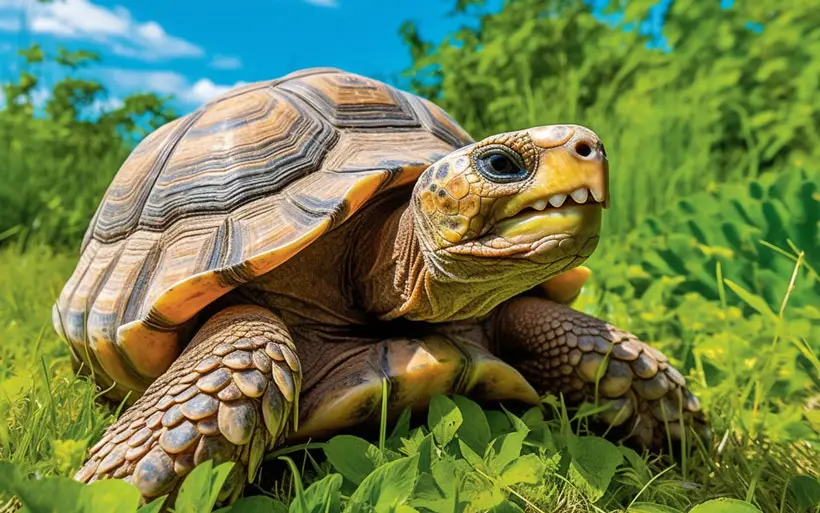
Hence it is recommended to always stay vigilant and look out for these major symptoms. Contact and see a vet asap if your Sulcata tortoise exhibits any of these!
- Vomiting
- Gasping
- Not eating or eating very limited amounts of food
- Swelling or lumps
- Lethargy even in colder ambiance
- Runny nose or eyes
- Walking with its head dropped
Role Of Mental Contentedness In Enhancing Your Tortoise’s Life Span
As already discussed, Sulcata tortoises in the wilderness live longer than in captivity due to them being happier out in the wild. Why are they happier in the wilderness, you may ask?
Well, it is because they have a purpose! Sulcata tortoises are not very social when it comes to human interaction. However, like every other animal, they also need their daily dose of dopamine in their neutrons.
Just placing food near their habitat and letting them search for their meals makes a huge difference. It gives them both a sense of purpose and also a sense of achievement when they get to find their food.
Here is a video to help you set up a Sulcata tortoise enclosure inside or outside of your house in any safe compartment.
FAQ
Below, we will discuss the most frequently asked questions regarding the Sulcata tortoise lifespan.
Yes, a healthy tortoise would weigh within the recommended weight range. Malnutrition and obesity negatively contribute to a Sulcata tortoise’s lifespan. Hence, according to your pet’s age and size, manage their meal responsibly.
Not at all, unless your tortoise displays signs of complete lethargy, there is no reason to worry. Tortoises generally have a very slow metabolism, which in turn helps them to live as long as they do.
Most tortoises have very delayed sexual maturity, and the Sulcata tortoise is no exception. It can take them from 15 years up to 20 years to reach sexual maturity, and there is nothing to worry about.
Conclusion
In this article, we have extensively discussed how long a Sulcata tortoise lives. To conclude, the Sulcata tortoise lives from 50 years up to 150 years.
There are several factors that either reinforce or hamper your Sulcata tortoise’s lifespan, such as environment and diet. The key to ensuring your pet lives a long and healthy life is to care for it.

